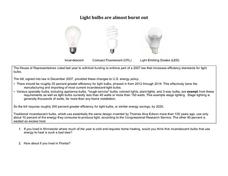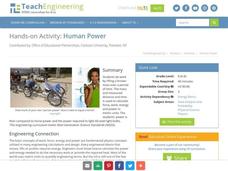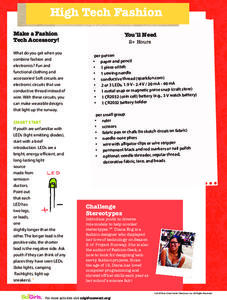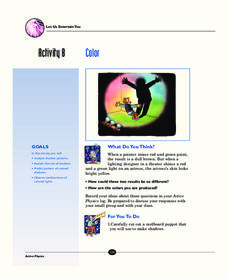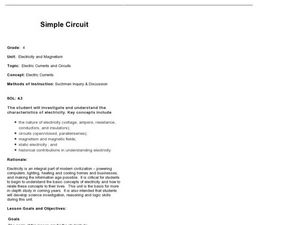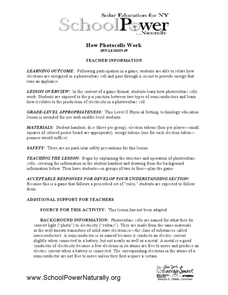Colorado State University
How Can You Demonstrate the Different Efficiencies of Different Light Bulbs?
Need a bright idea for an engaging lab? Watch your class light up as they explore the difference in efficiency between incandescent and LED bulbs! The resource makes use of simple materials and encourages learners to infer what's...
DiscoverE
Make a Light Bulb
Could you reinvent the light bulb? Scholars tap into their inner Thomas Edisons to build a light bulb prototype out of a jar and some wires. They see how long the filament wire glows in the jar (batteries not included) to measure their...
Curated OER
Light Bulbs are Almost Burned Out
Incandescent light bulbs were enlightening more than 130 years when Thomas Edison invented them. More recently, US Congress passed legislation to increase efficiency standards. Your 5th, 6th, or 7th graders will be enlightened as they...
DiscoverE
Let Your Lights Glow
Put those old holiday lights to good use. Individuals use a section of ornamental lights to create electric circuits. If the lights glow, it's a success; otherwise, it's time to try again!
Curated OER
The Photoelectric Effect in Photocells
Illuminate your physics class with this examination of a photovoltaic cell. Teach the structure and operation of the device using a diagram. Then make a human-powered, larger-than-life sized model of a PV cell. Learners become electrons...
Curated OER
The Shocking Truth About Fruit
Looking for a great lesson on circuits and conductors of electricity? Take a look at this one! In it, 6th graders create circuits out of pennies, washers, alligator clips, fruit, and LED’s. Learners use voltmeters to analyze the circuits...
Teach Engineering
Human Power
How many humans does it take to power a light bulb? The 10th part of a 25-lesson Energy Systems and Solutions unit has learners conduct an experiment to calculate power. They then use the results to determine how many classmates they...
DiscoverE
Electrical Liquids
Liquid or not, here comes the electricity. Scholars test the conductivity of various substances using a circuit that includes a light bulb. If the light bulb lights up, then the liquid is a conductor. What a bright idea!
PBS
Real-World Ratio and Rate Reasoning: How to Power the Skate Park
Bring on the lights! Using an interactive, characters try to figure out how to light a skate park by examining area and ratios to determine the number of solar panels needed to power them. Pupils design a house with a roof to hold solar...
University of Houston
The Snow Queen Study Guide
Even the kindest friends can become selfish and tyrannical in Hans Christian Andersen's "The Snow Queen." Class members complete story-themed exercises in language arts, social studies, and even physical science.
Bonneville
Introduction to Circuits
Light up the class's knowledge. Pupils build a simple circuit using a battery, wire, and a light bulb and create a diagram of their circuit. The teacher provides a short lecture on a complete circuit, calling attention to the direction...
Bonneville
What is Electricity and How Do We Use It?
Use some electrifying lessons to learn about electricity. Future scientists discover the history of electricity and the basics of electric circuits. They learn how to read an electricity bill and then create circuits to power a fan,...
New Jersey Historical Commission and New Jersey Council for the Humanities
Thomas Edison: The Wizard of Menlo Park
What would change in your daily life due to a power outage? Here, learners explore the inventions brought to us by the one and only, Thomas Edison, and imagine a day without them. Scholars take part in a grand conversation and write a...
Kenan Fellows
Electricity: Sources, Usage, Challenges, and the Future
What does the future of energy look like? Junior engineers collaborate to discover a solution to the global energy crisis during a very hands-on lesson. The unit focuses on learning through collaboration to develop a deep understanding...
National Wildlife Federation
Wherefore Art Thou, Albedo?
In the sixth lesson in a series of 21, scholars use NASA data to graph and interpret albedo seasonally and over the course of multiple years. This allows learners to compare albedo trends to changes in sea ice with connections to the...
PBS
High Tech Fashion
Creatively combine clothes and conductors. Pupils learn how to use conductive thread to make electric circuits. They apply the thread to design and build an accessory item with LEDs.
PBS
Thomas Edison: Inventor and Entrepreneur
How many of Thomas Edison's inventions do your scholars use every day? They might be shocked to find out! Young historians watch a video, analyze a photograph, and read one of Edison's letters to learn more about his life and impact....
It's About Time
Color
How can a hand puppet's shadow look like a dog? The lesson explains the science behind shadows, combining paint colors and the colors used in old televisions. Scholars use white, red, blue, and green lights to experiment with colors...
Teacher Created Resources
Problem and Solution: By Jove, I Think You've Got It
Through grand conversation, help scholars identify issues that harm the Earth and find solutions on how to solve them. After voting—on what your class deems the most important problem—stretch writing muscles with a problem-solution...
Curated OER
Solar Kit Lesson #1 - Solar Cell Inquiry
Give youngsters the components of a solar-powered electric circuit and turn them loose to figure out how to connect them in order for a light to shine or motor to turn. They compare energy output of a solar panel to that of a battery. On...
Curated OER
Simple Circuit: Electric Currents and Circuits
Through inquiry and exploration, 4th graders will learn and understand the functions of open and closed circuits. They will break into 2 groups, define vocabulary, hypothesize how to light a bulb, then test their hypothesis 4 different...
Bonneville
Three Ways to Generate Electricity
Get your hands on electricity. Pupils investigate magnetic fields and make the connection to generators in the fourth lesson in a series of six lessons on wind versus solar energy. Learners use a small electric motor as a generator to...
Curated OER
How Photocells Work
Give small groups of physical scientists tokens that represent electrons in a photovoltaic cell. They play a dice game in which they move the tokens around, representing the flow of electrons through the p-n junction of a semiconductor...
LABScI
Circuits Lab: Lightbulbs
Electrons flow from negative to positive, but the general consensus is that current flows from positive to negative. Scholars explore current through construction of circuits in both series and parallel. The focus is on voltage,...
Other popular searches
- Label the Light Bulb
- Battery and Light Bulb
- Light Bulb Parts
- Light Bulb Thomas Edison
- Light Bulb Efficiency
- Edison Light Bulb
- Battery Light Bulb
- Electricity Light Bulb
- Light Bulb Ornament
- Light Bulbs and Batteries
- Comparing Light Bulbs
- Three Way Light Bulbs


